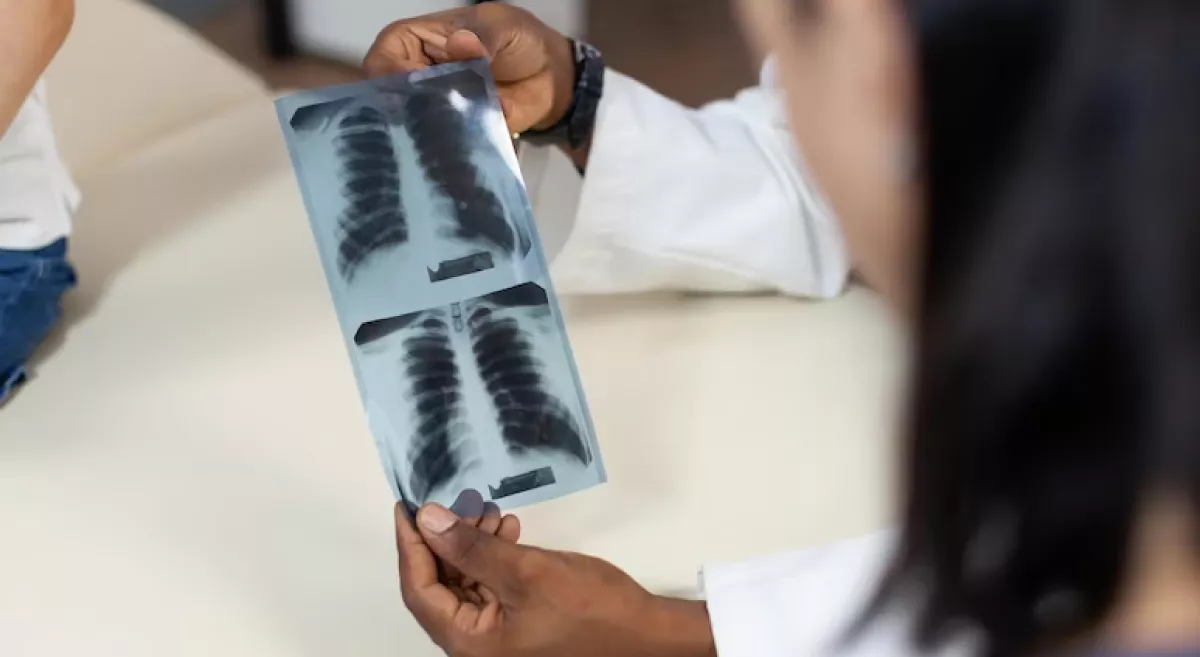Welcome to our Interstitial Lung Disease (ILD) clinic! We are dedicated to providing compassionate and expert care to patients with a wide range of ILDs. Our team of experienced and specialized healthcare professionals includes pulmonologists, respiratory therapists, nurses, and social workers who work together to offer comprehensive evaluation, diagnosis, and treatment of ILDs.
What is Interstitial Lung Disease (ILD)?
ILD is a group of chronic lung diseases that affect the tissue and space around the air sacs in the lungs, called the interstitium. This leads to inflammation, scarring, and thickening of the lung tissue, which can result in breathing difficulties, coughing, and fatigue. There are many types of ILD, including idiopathic pulmonary fibrosis (IPF), sarcoidosis, and connective tissue disease-associated ILD (CTD-ILD), post Covid lung fibrosis among others.
Our Services:
At our clinic, we offer a wide range of services to help patients manage their ILD. These include:
Diagnostic Testing: We use a range of state-of-the-art diagnostic tools, such as pulmonary function tests, DLCO, chest x-rays, CT scans, and bronchoscopy, to accurately diagnose ILD.
Treatment: Our ILD specialists work with patients to develop personalized treatment plans based on their specific needs and type of ILD. We offer a range of treatments, including medications, oxygen therapy,
Pulmonary rehabilitation, and lung transplant evaluation.
Support Services: Living with ILD can be challenging, so we offer support services such as counselling, social work, and patient education to help our patients and their families manage the physical, emotional and financial aspects of their condition.
Clinical Trials: As a leading ILD clinic, we offer access to cutting-edge research and clinical trials for patients who may benefit from new and innovative treatments.
FAQs
At Aster Hospitals we provide the highest quality of care and a transformative experience for all your healthcare needs. With our network of multi-speciality hospitals, specialised doctors, and world-class technology, we bring global standards of medical care to our patients.
What is ILD?
ILD, or Interstitial Lung Disease, refers to a group of lung disorders that primarily affect the interstitium, which is the tissue surrounding the air sacs in the lungs. There are many different types of ILD, including idiopathic pulmonary fibrosis (IPF), sarcoidosis, hypersensitivity pneumonitis, and others.
How is ILD diagnosed?
The diagnosis of ILD involves a thorough evaluation, including a detailed medical history, physical examination, imaging studies, and sometimes lung function tests. High-resolution computed tomography (HRCT) scan of the chest is a crucial imaging modality that helps identify specific patterns of lung abnormalities.
What treatment options are available for ILD?
The treatment of ILD depends on the specific type and severity of the disease. In some cases, addressing the underlying cause, such as discontinuing medication or treating the underlying autoimmune condition, may help slow down the progression of ILD. Medications such as corticosteroids, immunosuppressants, and antifibrotic agents may be prescribed to reduce inflammation and fibrosis. Oxygen therapy, pulmonary rehabilitation, and lung transplantation are also treatment options for advanced cases of ILD.
What is the prognosis for ILD?
The prognosis of ILD varies depending on the specific type, stage, and individual factors. Some ILDs have a relatively slow progression, while others may progress rapidly. It is important to have regular follow- up with a healthcare professional to monitor the disease, adjust treatment as needed, and address any complications that may arise. Early diagnosis and appropriate management can help improve quality of life and potentially slow disease progression.
What are the common symptoms of ILD?
However, common symptoms include progressive shortness of breath (dyspnea) during exertion, dry cough, fatigue, weight loss, discomfort of chest, and clubbing of the fingers (enlarged fingertips). It is important to note that ILD can have a gradual onset, and symptoms may be initially mild before worsening over time
What are the potential causes and risk factors for developing ILD?
The causes of ILD can vary widely. However, certain factors and exposures can increase the risk of developing ILD. These include long-term exposure to occupational and environmental toxins (such as asbestos, silica, and certain chemicals), certain medications, autoimmune diseases (like rheumatoid arthritis or scleroderma), infections, and a family history of ILD.
Can lifestyle changes help manage ILD?
Yes, certain lifestyle modifications can help manage ILD and improve overall well-being. Quitting smoking is essential, as smoking can worsen lung damage and accelerate disease progression. It is also advisable to avoid exposure to environmental irritants, pollutants, and occupational toxins that can exacerbate ILD symptoms. Eating a balanced diet, staying physically active within individual limitations, and seeking emotional support can also contribute to better management of ILD.
Are there any support resources available for individuals with ILD?
Yes, there are support resources available for individuals with ILD. Organizations such as the Pulmonary Fibrosis Foundation, American Lung Association, and ILD support groups provide valuable information, resources, and support networks for patients and their families. These resources can offer emotional support, educational materials, and connections to healthcare providers who specialize in ILD
Blogs
The source of trustworthy health and medical information. Through this section, we provide research-based health information, and all that is happening in Aster Hospital.







